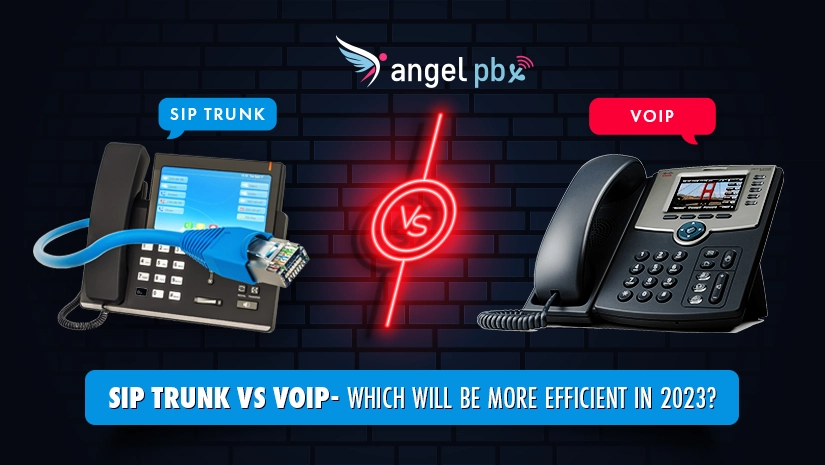
Sip Trunk Vs VoIP- Which Will Be More Efficient In 2023?
- November 24, 2022
SIP is a protocol that makes VoIP possible, VoIP and SIP are separate but related concepts. When developing the communication solution for your company, having an understanding of the differences between the two provides you an advantage. You will likely have to make a choice at some time over what to market as your primary voice communications approach if you're a communications provider (CP) or an IT provider. This is a question we frequently hear due to our tight collaboration with our business partners.
The business sector is going crazy over SIP trunking. Transparency Market Research estimates that the worldwide SIP trunking services market might expand at a pace of 13% per year until 2030, meaning SIP trunking could reach a market value of US$ 35.5 billion by that time. What impact is technology having on how businesses communicate? Many times, people use SIP trunking technology to support their everyday chat, audio, or video communications without even realizing it. Additionally, most businesses are unaware of the specifics of SIP services operation or what to anticipate from them. Without utilizing muddled industry jargon or obscure acronyms, let's discuss some of the essentials of SIP trunking, such as its definition and how it functions.
To know more, make sure to read the blog till the very end to get all the insights now.
What Distinguishes Voip From SIP?
Let's start by discussing terminology. Although theoretically, they are not all that dissimilar, we frequently discuss VoIP and SIP as if they were two completely separate things. When your customers inquire about VoIP, they are most likely looking for hosted seats, however when they inquire about SIP, they are typically referring to SIP Trunking as a straight ISDN replacement. SIP signaling is used by hosted seats to start a call session and deliver calls to an IP provider. Therefore, they effectively carry out identical action.
Describe SIP Trunking? Facts To Know
Session Initiation Protocol, or SIP, allows for the transmission of unified communications services over the internet. SIP trunking, then, is the combination of many SIP session branches, or channels. A different technology known as IP-enabled PBX (Private Branch Exchange), which is effectively a private phone network that expands on the phone-system functions that matter the most to companies, allows for the truncation of several SIP sessions.
SIP V/S Voip: Which One Shall Be More Efficient In 2022?
By switching from conventional phones to SIP, businesses may save money right away and scale up to access more advanced features and productivity tools. It's essential to look at how SIP can turn VoIP into a multimedia communications experience rather than a voice-only internet phone service in order to compare SIP to VoIP effectively.
If ever you had been wondering of what is more important or which one shall be more efficient in 2023, then we do bring to you the list of the statements pertaining to it, which are as follows:
Voip With SIP Advantages:
- Allows businesses to combine technology into unified communications, which has the potential to result in immediate cost savings on commercial applications.
- If data connectivity is lost, it offers failover to mobile devices used by employees.
- May provide organizations a high degree of price freedom by letting them add on products and lines as they see fit.
- Convenient administrative tools for adding lines and features are included.
- Can effortlessly interface with cloud apps while implementing unified communications.
- For increased efficiency, some may have a built-in interfaces with popular business applications and software.
- Ip lines that are already in use might be connected to form a hybrid phone system.
Voip With SIP Disadvantages:
- For SIP to provide a high-quality service there must be enough internet bandwidth.
- Service levels provided by SIP providers might differ in quality.
- Different SIP providers offer different capabilities, some of which might not be complete unified communications solutions.
- SIP via a shared internet connection may come with quality and security issues instead to a dedicated fiber-optic internet service provided by the same company as your SIP provider.
Voip Vs. SIP: SIP Takes The Win
As you can see, compared to conventional or fundamental VoIP technology, business SIP Trunking Provider offers enterprises a lot more features. SIP allows users to interchange files and other types of data via the internet and is no longer limited to voice or video conversations (though it still is an option). It's not always easy to compare SIP with VoIP, to be honest. SIP serves as a useful tool for VoIP, therefore it essentially functions as an additional communication component.
Conclusion
You should consult the professionals at Angel PBX if you're looking for a new communications solution. We provide SIP and IP phone systems, and we can put whichever one is best for your company into use. Contact us right now to find out more about how we can support your company.
Also, visit our blog space to read more interesting blogs.